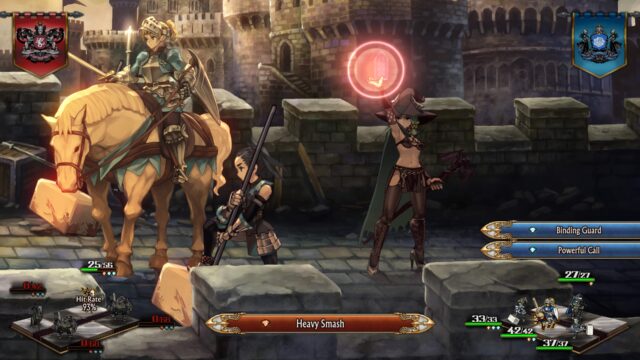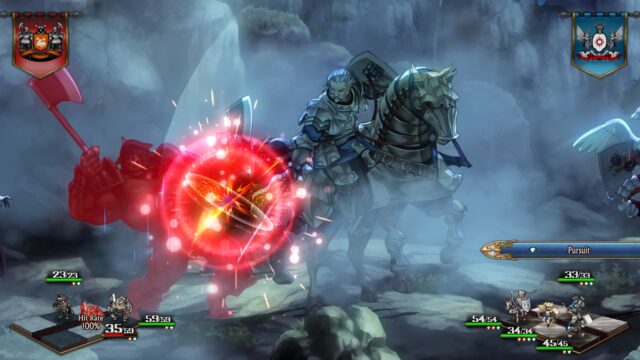Unicorn Overlord Review
A True Gaming Unicorn
Vanillaware is a developer with a striking visual style that has a penchant for providing a depth of gameplay mechanics that resonate with the niche gamer. Unicorn Overlord is able to continue this tradition while tying in plenty of user friendly aspects that make it a consistently approachable title that always gives the player something enjoyable to do. The depth and pacing is so well balanced that it is hard to put the controller down when there’s such a bevy of gameplay options and presentation to take in that’s at a consistently high caliber.
Unicorn Overlord follows the trials of Alain, a young prince of the nation of Cornia, who is dealing with his country being overtaken by its former general Valmore. Valmore systematically overthrows each nation of Feyrith to form the Zenoira Empire, taking the name Emperor Galerius. Alain learns this truth while he slowly gathers good leadership skills through firm decisions balanced with his humble and compassionate nature. This endearing attitude makes Alain a compelling protagonist and magnet for the game’s continually eccentric and interesting personalities that come to join or antagonize his Liberation Army.
Each nation in Unicorn Overlord has different beautiful topography accompanied by its own orchestral overworld and battle themes. From snowy lycanthropic Bestral lands, ageless Elven woods, and religious grounds filled with Angels, to areas featuring complicated histories full of intrigue, each nation boasts something new and enticing. Between the heavy-hitting story beats filled with betrayal and acts of regret, there are also moments of levity. The lighter moments generally come from rapport conversations, which also serve to help demonstrate growing bonds between characters, but also from visual quirks such as mounted characters rarely being shown off mount. This just adds to the charm of Feyrith and balances out the more serious aspects of the story in great and sometimes unexpected ways.
A fantastic sense of balance is prevalent in all things and players are rewarded around every corner. Every stage won provides progress in one way or another, whether it is additional resources, background story, new equipment, and so on. There’s a whimsical sense of discovery that never dulls throughout the adventure. Driving much of the progress is the multipurpose Honor resource that players can earn. Honors are obtained from winning stages, selling resources found in the overworld, or by restoring towns. In turn, using Honors allows players to expand their characters in a combat unit, the total amount that can be deployed at one time, recruit mercenary units, and more.
Building units within the Liberation Army is simple yet expansive. Although players can buy them as wanted, generic recruits are rarely necessary since more than enough story-based units can join to fully fill out the ranks. Building stronger units and experimenting with different combatant combinations is endlessly enjoyable, but moving them around too much can be a drawback if trying to build rapport. This can be mitigated via Alain giving gifts to those standing guard on the overworld or buying meals in taverns. Rapport builds units up with mini-stat boosts depending on the classes involved in the bonding, while also unlocking vignettes for some pairings. These are always endearing background stories that bring depth to each of the members of the Liberation Army. Alain is able to forge a bond with anyone, which comes into play during later story beats, while others are based off of a shared history or common interests.
Players can traverse freely across Unicorn Overlord‘s world, with all battles taking place on the same map. Searching for items, digging for resources, and solving basic puzzles found throughout the nation all funnel into forms of loot gathering that just never grows old. Resources found are used to restore towns to their pre-war glory or can be sold in towns to get extra Honors. Every liberated town leads to more wandering NPCs to converse with, mercenaries to spar, and other potential unlocks. Each of these are addictive in their own right, but together they make for something special. Particularly engrossing is the short mining mini-game where timed button presses shave points off items found via a radar that responds to each strike of the pickaxe, with rarer items, such as treasure maps requiring more timely presses. All of these forms of exploration and loot gathering are optional and can be skipped at any point if players want to do so.
Combat has a lot of variety making it a consistent treat. Before each stage, an overview listing the main enemy types is displayed, making it easier to prepare appropriate units if needed. Varying map sizes with additional topographical details, environmental hazards, and win/loss conditions make each fight unique. Units move in real time, with contact between units shifting to a special side-on view to display the automated turn-based encounter. Players start each stage with three-to-five Valor points, which are used for deploying units or on special skills each character has access to before entering direct combat. Valor is gained by defeating enemies or capturing towns, but maxes out quickly giving players plenty of enjoyable opportunities to use it freely on skills, adding to the wealth of options during combat.
Units are organized into back and front rows with three slots each. At the beginning of the game positioning is more important as both unit and character sizes start small, making weaker characters more vulnerable. As things progress, fully formed strike teams become able to one-shot specific enemy classes or just damage entire rows and columns with powerful attacks. Before each encounter, players have the option to potentially sub in another nearby unit, re-arrange unit skills and tactics, and add items that try to alter the outcome.
Every character’s behaviour and actions during an encounter is decided prior to combat through a semi-programmable set of conditions, though players can let the game set these up for them. There’s plenty that can alter things if it looks like the player will lose and finding how these shifts in tactics play out is a statistical dream. Dodges and critical hits always keep players on their toes as well, since these are determined prior to combat and do not change until another fight has completed. Damage is dealt as a grand total to either side, which makes receiving damage a nail-biting game of chance to see whether all the hurt is dished out on a single character or is spread out amongst the members of the unit. These fights are not just an array of numbers to enjoy or exploit, but combat plays out in a beautiful visual manner that combines with the battle theme to make it thrilling time after time. Experience is gained after each fight, with the biggest amount given to the unit dealing the final blow allowing for creative use of levelling weaker units by picking apart a tough enemy.
Individual character tactics and abilities become great instruments as Unicorn Overlord progresses. Each class learns three active and three passive abilities, with more becoming available through equipment. Characters start with one active and passive point to use on skills and actions in each encounter, gaining more with upgrades and equipment. These abilities work just fine straight out of the box, but each can also be tweaked to ensure when and how it is used. For example, a heal skill is set by default to activate whenever anyone takes damage, but can be altered to trigger only when someone is seriously injured, thus bypassing that ability and freeing up an active point for an attack instead. Tweaking these tactics can not only make high-level fights successful earlier in the game but also can ensure bragging rights in the online Colliseum. Colliseum fights pit a chosen unit against another player’s uploaded one in thrilling clashes, even if they can get stamped out quickly by the opponent.
Everything is so easily accessible in Unicorn Overlord. While there is always something available to progress, many of these elements are entirely optional, and players can blitz through the story or take their time completing everything. The game leaves room for multiple play styles. Not only does it keep offering more, but it also respects the player’s time through numerous user-friendly interfaces such as using the Rapport menu to transport immediately to the conversation point instead of backtracking to the area for the vignette. Resources can be mined manually or gathered automatically when the nearby town has a guard stationed. Pacing of treasures and overworld quests is done in a different manner for each nation to throw off repetition.
This regard for timing even extends into combat. Each fight between two units has the option for an auto skip, being displayed as beautifully rendered real-time panoramic fights, or sped through with a simple hold of a button. These options make everything feel as cinematic as players wish it to be, which is also reflected in how the fights ramp up in each nation. Major climactic stages feel like they could change a nation with their size, scope, and ingenuity, while simpler town liberations or experience grinding sigil stages move more briskly and are more straightforward.
The visuals in Unicorn Overlord are given a lot of care. Overworld maps are meticulously designed to the smallest detail. Every available inch serves a purpose, whether as a part of a combat stage, a bit of flavour detail to make the nation feel a bit more realistic, or to serve as a landmark for a treasure map. Combat and story scenes have wonderfully crafted character designs and fluid movement that make everything breathtaking.
Every nation visited has its own catchy piece of musical accompaniment. This makes the entire soundtrack an enjoyable symphony of orchestral arrangements that occasionally blend in chanting and lyrics, resulting in a feast for the ears. Voice acting is done well with every performer matching their character’s personality to enhance the story scenes; sadly, this additional touch is missing from the rapport vignettes. However, the combination of painting-like backgrounds that feature beautifully animated characters delivering poignant vocal lines that lead to the orchestral battle music pounding in like the climax of a season-ending television show will have players on the edge of their seat throughout.
Unicorn Overlord is a masterfully crafted video game. The player is given as much or as little to do as they wish, with every new nation, stage, backstory, and time-engrossing side venture all weaving into one another in a way that never feels forced. All of this is actualized with music and visuals to consistently dazzle and delight as the world is delved into deeper. This pacing is crafted with incredible flexibility such that one player may spend minutes doing something another will spend hours on and both finding their time well spent. Combat is a constantly shifting bout of delightful visuals as tactical options and classes keep things enticing. It takes a special title to reach all gaming sensibilities and Unicorn Overlord does so with such style and flair that everyone should test it for themselves.
Disclosure: This review is based on a free copy of the game provided by the publisher.


Perfectly paced
Easily accessible so that the newest tactical game fan or the most harden of veteran can enjoy
A sight and sound to perfectly match every scenario
Characters, particularly the protagonist Alain, are always endearing and interesting
Rapport scenes missing the wonderful voice acting
Some town liberations add little to the way of side stories or plot










Recent Comments